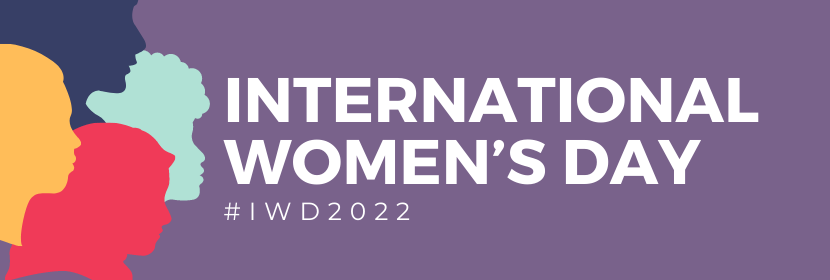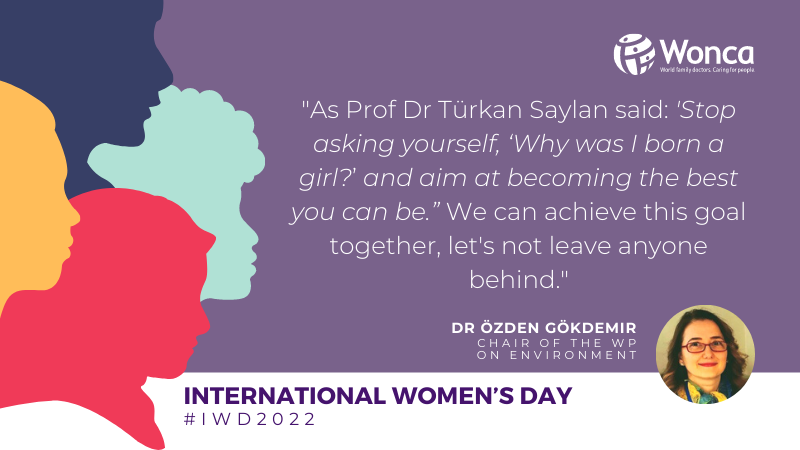IWD2022: Dr Özden Gökdemir "Let's not leave anyone behind"
 “Stop asking yourself, ‘Why was I born a girl?’ and aim at becoming the best you can be.”
“Stop asking yourself, ‘Why was I born a girl?’ and aim at becoming the best you can be.”
Prof Dr Turkan Saylan
Masculine thought in society is associated with a set of roles, behaviours, and values which attribute to women a disadvantaged position and lead to the perpetuation of the model of inequality.(1) Gender inequality affects both men and women. It is a significant impediment. There are inequalities and differences in health care between men and women, as well as biological sex. The sexist viewpoint also has a significant impact .(2) Male bias is also a factor in decision making. Adams et al. revealed a need for better developed risk and diagnostic models of Coronary Heart Disease for women, particularly with regard to the influence of age, which was the primary source of gender differences between patients. (3). At this point, “gender blindness” become another problem.
To overcome these difficulties, community oriented primary care (COPD) could be a useful tool. (4) To counter economic burdens and the violence of war in different areas of the World, which transformed COVID-19 pandemics to syndemics, COPD employs basic steps, such as “community definition, community characterization, prioritization, detailed assessment of the selected health-problem, intervention and evaluation” (4)
Two important examples of putting this concept into practice are from Turkey. The firstis from Karain, Ürgüp, Göreme, where the aim was to find the root cause of early deaths from “asbestosis”. “To fix a problem” was the primary motivation, and this success of saving lives was based on evidence-based publications, and research with the collaboration of not only physicians and those living in the affected villages, but also with others including geologists, and teachers. Emri also stated that “The research was not motivated by grants or publications. Moreover, the researchers did not give up because of the many problems encountered associated with conducting medical research in a remote part of the world.” This revealed the success of the team approach. (5)
The second example is the work of Prof Dr Turkan Saylan, a role model in overcoming difficulties. “She was one of the first female dermatologists in Turkey, and a leading figure in the fight against leprosy “. In 1989, she became a founding member of the Association to Support Contemporary Life (CYDD), a non-governmental organization (NGO) that has the aim of enrolling young girls in school. Saylan's years working in rural Turkey inspired the creation of CYDD. Saylan received a number of international honours, including the International Gandhi Prize in 1986. In Turkey, she published seven books, including the autobiographical ‘The Sun Rises Now Out of Hope’.(6)
The conclusion is from Prof Dr Saylan “Stop asking yourself, ‘Why was I born a girl?’ and aim at becoming the best you can be.”
 By Dr Özden Gökdemir,
By Dr Özden Gökdemir,
Chair of WONCA Woking Party on Environment
References:
1. Celik HH, Klinge II, Van Der Weijden TT, Widdershoven GGAM, Lagro-Janssen TALM. Gender sensitivity among general practitioners: Results of a training programme. BMC Med Educ. 2008;8:1–6.
2. Verdonk P. Gender Matters in Medical Education: Integrating a gender perspective in medical curricula. Radboud University Nijmegen Medical Centre. 2007.
3. Adams A, Buckingham CD, Lindenmeyer A, McKinlay JB, Link C, Marceau L, et al. The influence of patient and doctor gender on diagnosing coronary heart disease. Sociol Heal Illn. 2008;30(1):1–18.
4. Mash B, Ray S, Essuman A, Burgueño E. Community-orientated primary care: a scoping review of different models, and their effectiveness and feasibility in sub-Saharan Africa. BMJ Glob Heal. 2019;4(Suppl 8):e001489.
5. Emri SA. The cappadocia mesothelioma epidemic: Its influence in Turkey and abroad. Ann Transl Med. 2017;5(11):1–11.
6. Solberg K. Turkan Saylan. Lancet [Internet]. 2009;374(9683):22. Available from: http://dx.doi.org/10.1016/S0140-6736(09)61224-1